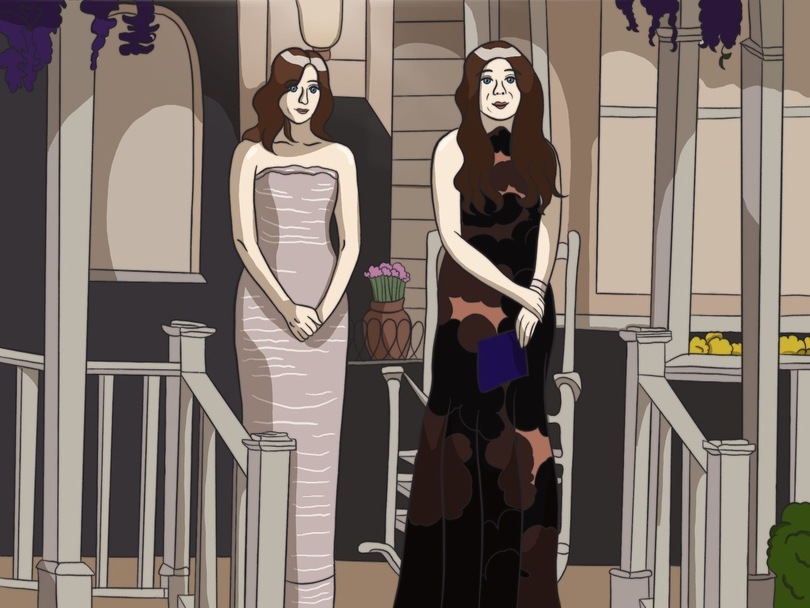25th anniversary of ‘Gilmore Girls’ highlights status as timeless classic

The mother-daughter relationship between "Gilmore Girls" stars Lorelai and Rory is perfect at face value. But as the show progresses, Lorelai’s projections on Rory become clear, our columnist writes. Maria Masek | Contributing Illustrator
Get the latest Syracuse news delivered right to your inbox.
Subscribe to our newsletter here.
Soup bowl-sized coffee mugs, orange and red trees and big cozy sweaters: these are some of the things that exemplify “Gilmore Girls,” one of the most streamed TV shows in history.
“Gilmore Girls” is the quintessential fall comfort show. With its nostalgic atmosphere and its classic characters, many devotees find themselves rewatching it year after year when the leaves begin to turn.
Now, commemorating its anniversary, I’m taking a look at everything Gilmore — the characters, the plots — and exactly how it remains a timeless classic 25 years later.
At its core, “Gilmore Girls” is about family. It follows the evolution of Lorelai and Rory Gilmore, who have a seemingly perfect mother-daughter relationship. Rory’s grandparents aren’t so perfect, disapproving of Lorelai’s dismissal of their high-class lifestyle.
The majority of the plot is set up as an “us against the world” narrative. Lorelai and Rory tackle everything together — navigating prep school, college, entrepreneurship and dating. No matter what life throws at them, the Gilmore girls have each other.
“Gilmore Girls” fans span generations. The show is appealing to millennials because of its romanticized view of a pre-social media world and to Gen Z because of well-rounded characters that a lot of sitcoms lack.
Almost every episode, Rory and Lorelai drink buckets of coffee each day and eat copious amounts of candy and takeout while continually boasting small waists. They banter at three times speed, making pop culture references that seem obscure to viewers today.
As they watch, the audience yearns to be a part of their bubble of wit and laughter. Does it really matter what they’re saying as long as they’re moving around their kitchen and flipping their hair while they say it?
The show is full of iconic one-liners and famous quotes like,“Who cares if I’m pretty if I fail my finals?,” “People can live a hundred years without really living for a minute” and, “If you’re going to throw your life away, he better have a motorcycle!”
Then, you have the men. Dean, Jess, Logan, Max, Luke and Christopher — the Gilmore girls’ love interests mirror their coffee — hot and oftentimes gone too soon.
When discussing the show with a friend, one of the first questions that usually comes up is, “Who do you think Rory should have ended up with?”
Right answers differ, but there’s a universally acknowledged wrong one: Dean.
Rory’s first boyfriend on the show, Dean appeals to her for his charismatic, charming personality and his tall, dark and handsome good looks. Dean protects Rory, supports her and is overall the perfect first boyfriend.
When they break up and get back together, however, it’s an entirely different story. He’s moody, pushy and just altogether not right for Rory. In Season 5, Dean cheats on his wife with Rory. If other viewers were anything like me, they were staring at their TV screens in horror begging Rory to turn around and choose absolutely anyone else.
Entering in Season 2, Jess is completely different. He seems to be Dean’s opposite — the ultimate bad boy. While their relationship had its ups and downs, Jess stans advocate for him because of the support and interests he shares with Rory.
I, however, am 100% team Logan. He’s the perfect man for Rory; he helps her let loose and have fun while supporting her career and her interests. The “You Jump, I Jump, Jack” scene is absolutely iconic, and if I were her, I would’ve said yes to his proposal at graduation.
When it comes to Lorelai’s relationships, I have only this to say: Christopher was the worst person ever, Max was right if she’d been able to commit to him, and, of course, her and Luke were meant to be. Everyone else (*cough* Jason *cough*) is irrelevant.
Going through romantic ups and downs with the characters was important on the show because it was relatable. There were no big dramatic “Grey’s Anatomy”-esque moments. The Gilmore girls experienced trials and heartbreak in a way that’s actually realistic.
On the other hand, while obviously entertaining, I can’t help but acknowledge some of the show’s, and the characters’, obvious flaws.
As I grew up and rewatched, Lorelai went from the ultimate girl’s best friend to appearing juvenile, controlling and immature. She tries to live vicariously through Rory, pushing her toward the life that she wishes had been available to her instead of the life Rory actually wants. When Rory enjoys golfing with her grandfather, Lorelai is upset about it and the fact that Rory wouldn’t make fun of the experience.
Both Lorelai and Rory have an exaggerated case of main character syndrome, making everyone in their lives bend over backwards for them while giving almost nothing in return. They act as though they have no support and are forced to do everything on their own, but they both have Lorelai’s extremely rich parents to fall back on. They’re the definition of privileged, even as they pretend to be underdogs.
Aside from the characters, the overall show has one main issue: It romanticizes teen motherhood while stigmatizing sex.
This contradiction is evident throughout the series. Lorelai and Christopher’s lives were “thrown away” after they had sex and Lorelai got pregnant. A whole episode is devoted to Rory’s first kiss, but not how it impacts her and Dean’s relationship. Instead, it’s about how her mother sees it and why having a relationship could be bad.
Throughout the entire show, Rory is warned against losing her virginity and faces consequences anytime she’s intimate with someone. When she finally does have sex, it breaks up a marriage.
Lane, Rory’s best friend, has moved away from religion but feels pressure to wait until marriage to have sex. Then, after her very first time, she ends up pregnant with twins.
Paris, another friend of Rory’s, blames her rejection from Harvard University on the fact that she lost her virginity and has been having sex with her boyfriend, Jamie. Even worse, Rory and Lorelai seem to agree with her — Lorelai celebrating that she has the “good kid” when she learns Paris is having sex but Rory isn’t.
The show centers around how much better Lorelai’s life is after having Rory at 16, but then celebrates virginity and creates drastic consequences for having sex. This twisted narrative is hypocritical and a bad influence on young viewers who are just beginning to understand their relationships with their own bodies.
So why do I keep coming back? The show gets some important things right – women’s healthy relationships with food, supportive friendships and having a relatable “nerdy girl” main character.
Despite its flaws, the characters are relatable, the episodes are entertaining and it carries a certain fall magic in the title sequence. Happy 25th birthday Gilmore Girls, I love you.






